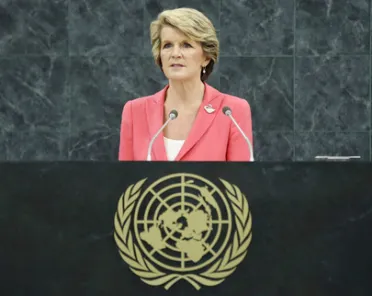Statement
Statement summary
JULIE BISHOP, Minister for Foreign Affairs of Australia, described her country as “an open, liberal democracy”, saying it had an unbroken record of peaceful democratic transition dating back to 1901. The new Government would put economic diplomacy at the centre of its foreign policy, she said, noting that Australia’s economic success and high living standards were anchored in reform efforts over many years. It had liberalized its economy and unilaterally dismantled trade barriers and protectionist policies. Noting that other economies had opened up and living standards improved around the region as well, she said that in South-East Asia, about 145 million people would be considered middle class in 2015, up from 95 million in 2010. More broadly, the middle class in Asia would reach 3 billion people by 2030. Indonesia was on track to become the world’s seventh-largest economy by 2013, up from the sixteenth today. China and India were projected to become the largest and third-largest economies by 2030, she said, pointing out that more than 290 million people in China had been lifted out of poverty between 1999 and 2009. Turning to the Millennium Development Goals and the post-2015 development agenda, she stressed the importance of financing infrastructure. According to the Asian Development Bank, Asia alone required $750 billion a year over the next decade to meet its infrastructure needs, far more than the $130 billion in annual global aid flows. Only the private sector had the capacity to mobilize such an amount of money, she emphasized. “We firmly be
JULIE BISHOP, Minister for Foreign Affairs of Australia, described her country as “an open, liberal democracy”, saying it had an unbroken record of peaceful democratic transition dating back to 1901. The new Government would put economic diplomacy at the centre of its foreign policy, she said, noting that Australia’s economic success and high living standards were anchored in reform efforts over many years. It had liberalized its economy and unilaterally dismantled trade barriers and protectionist policies.
Noting that other economies had opened up and living standards improved around the region as well, she said that in South-East Asia, about 145 million people would be considered middle class in 2015, up from 95 million in 2010. More broadly, the middle class in Asia would reach 3 billion people by 2030. Indonesia was on track to become the world’s seventh-largest economy by 2013, up from the sixteenth today. China and India were projected to become the largest and third-largest economies by 2030, she said, pointing out that more than 290 million people in China had been lifted out of poverty between 1999 and 2009.
Turning to the Millennium Development Goals and the post-2015 development agenda, she stressed the importance of financing infrastructure. According to the Asian Development Bank, Asia alone required $750 billion a year over the next decade to meet its infrastructure needs, far more than the $130 billion in annual global aid flows. Only the private sector had the capacity to mobilize such an amount of money, she emphasized. “We firmly believe that the economic growth of developing countries can be unlocked through trade.” The Australian Government was committed to promoting trade liberalization through the World Trade Organization, regional and sector-specific deals, and bilateral free trade negotiations.
lieve that the economic growth of developing countries can be unlocked through trade.” The Australian Government was committed to promoting trade liberalization through the World Trade Organization, regional and sector-specific deals, and bilateral free trade negotiations.
Full statement
Read the full statement, in PDF format.
Photo

Previous sessions
Access the statements from previous sessions.
